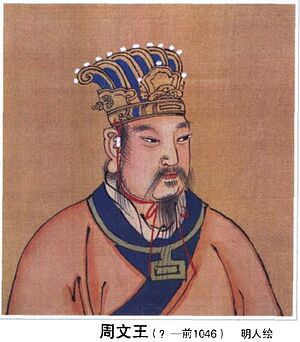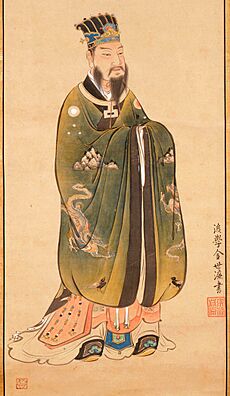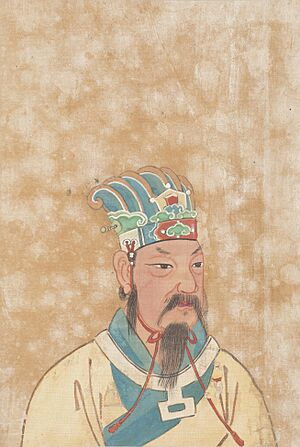King Wen of Zhou facts for kids
Quick facts for kids Ji Chang |
|||||||||
|---|---|---|---|---|---|---|---|---|---|
| Overlord of the West | |||||||||
 |
|||||||||
| Elder of the Predynastic Zhou | |||||||||
| Reign | 1100–1050 BC (50 years) | ||||||||
| Predecessor | Ji, King of Zhou | ||||||||
| Successor | King Wu of Zhou | ||||||||
| Born | 1152 BC (traditional) or 1112 BC (modern estimate) Bi (Zhou state) |
||||||||
| Died | 1050 BC (aged 62) Cheng (Zhou state) |
||||||||
| Burial | Bi (Zhou state) | ||||||||
| Spouse | Tai Si | ||||||||
| Issue | Bo Yikao King Wu of Zhou Xian, Marquis of Guan Dan Du, Marquis of Cai Feng, Count of Wey Wu, Count of Cheng Chu, Monarch of Huo Zheng, Count of Mao Zai, Monarch of Dan Zhenduo, Marquis of Cao Xiu, Marquis of Teng Gao, Count of Bi |
||||||||
|
|||||||||
| Father | King Ji of Zhou | ||||||||
| Mother | Tai Ren | ||||||||
King Wen of Zhou (Chinese: 周文王; pinyin: Zhōu Wén Wáng) was a very important leader in ancient China. He lived from about 1152 to 1050 BC, during the last years of the Shang dynasty. His real name was Ji Chang (Chinese: 姬昌). He was the wise leader of the Zhou state.
King Wen died before his family fully took over the Shang dynasty. His second son, Ji Fa, finished the conquest of Shang. This happened after the famous Battle of Muye. King Wu then honored his father, King Wen, as the true founder of the Zhou dynasty. Many ancient poems in the Classic of Poetry praise King Wen. Some people even call him the first epic hero of Chinese history.
It is important not to confuse King Wen with his fourth son, the Duke of Zhou. They were two different historical figures.
Contents
Discovering King Wen's History
Chinese experts have found clues about King Wen in old writings. These writings are on oracle bones found at a place called Zhouyuan. These bones mention an "Elder of Zhou region." Scholars believe this person is King Wen.
The Story of King Wen
King Wen's birth name was Ji Chang. His mother was Tairen and his father was Ji Jili. His father was the leader of the Zhou clan. The Zhou were a smaller group living near the Wei River in what is now Shaanxi. They were loyal to the powerful Shang Kingdom.
Sadly, King Wen's father, Jili, was betrayed and killed by the Shang king Wen Ding. This happened in the late 12th century BC. After his father's death, young Chang became the new leader of the Zhou family.
King Wen's Family Life
King Wen married a woman named Taisi. They had ten sons and one daughter together. He also had at least eight more sons with other women.
Imprisonment and Release
At one point, the Shang king, King Zhou of Shang, became worried about King Wen's growing power. The Marquis of Chong, an enemy of King Wen, spread false rumors about him. Because of this, King Zhou imprisoned King Wen in a place called Youli.
King Wen's eldest son, Bo Yikao, went to King Zhou to ask for his father's freedom. However, King Zhou was very angry. He had Bo Yikao killed. He then had his son's body prepared in a way that was meant to be cruel. This was done to trick King Wen into eating his own son.
Many officials respected King Wen because he was a good and fair leader. These officials, especially San Yisheng and Hong Yao, gave King Zhou many valuable gifts. They offered gold, horses, and women. Because of these gifts, King Zhou released King Wen. He also gave King Wen his personal weapons and a special title: Overlord of the West.
King Wen then offered King Zhou a piece of his land. In return, King Zhou allowed King Wen to make one last request. King Wen asked for a cruel punishment called the Burning Pillar to be stopped. King Zhou agreed to this request.
Planning to Overthrow the Shang
After returning home, King Wen secretly began to plan how to overthrow King Zhou. In his first year as Overlord of the West, he helped settle a land dispute. This was between the states of Yu and Rui. This act earned him even more respect among other nobles. Some nobles even started calling him "king."
The next year, King Wen found a wise man named Jiang Ziya fishing by the Pan River. King Wen hired him as a military advisor. He also fought off invaders called the Quanrong barbarians. He took over some of their land.
Over the next few years, King Wen continued to expand his influence. He campaigned against Mixu, a state that was bothering smaller states. He also attacked other states that were either controlled by Shang or were rebelling against Shang. He even defeated Chong, the home of his enemy, the Marquis of Chong. This victory gave him access to a special crossing point called the Ford of Meng. This ford would allow his army to cross and attack Shang.
By this time, King Wen had gained control of about two-thirds of the entire kingdom. These were either direct possessions or loyal allies. He then moved his capital city closer to the Shang, putting them under threat. However, King Wen died the following year before he could cross the Ford and attack Shang. Other stories say he died in battle during the Zhou campaign against the Shang.
Four years after King Wen's death, his second son, King Wu, continued his father's mission. King Wu crushed the Shang army at the battle of Muye. This victory led to the founding of the Zhou dynasty. The name "Wen" means "the Cultured" or "the Civilizing." King Wu made it an official royal name to honor his father.
The Mandate of Heaven
What is the Mandate of Heaven?
The idea of the Mandate of Heaven was very important during the Zhou dynasty. It was a way to explain why a ruler had the right to govern. This theory said that Heaven (a higher power) chose the ruler. It was like a king choosing a loyal helper. The ruler was seen as Heaven's "eldest son."
If a ruler was not good enough, Heaven would choose a new one. This change would often be shown by signs or disasters. People believed King Wen received the Mandate of Heaven. This was because the Shang kings had become too corrupt and lost their virtue.
Signs from the Sky
In 1059 BC, two unusual things happened in the sky. In May, five planets came very close together. This was the closest they had been in 500 years. A few months later, Halley's Comet appeared.
King Wen and his advisors saw these events as special signs. They believed these signs showed that Heaven had chosen him to rule. Early records describe this as "the great command in the sky." This idea became a very important part of Chinese political thought.
King Wen's Lasting Impact
Many of the oldest poems in the Classic of Poetry are hymns that praise King Wen. He was also a great hero to Confucius. Confucius's followers greatly shaped Chinese culture.
Divination and the I Ching
King Wen is also famous for his work with the I Ching. This is an ancient Chinese book used for divination (fortune-telling). He is believed to have arranged the eight trigrams into the sixty-four hexagrams. These are the main symbols in the I Ching. He is also said to have written the explanations for each hexagram. The most common order of the 64 hexagrams is called the King Wen sequence.
Posthumous Honors
In 196 BC, a later emperor named Han Gaozu gave King Wen a special title. He called him the "Greatest of All Kings."
King Wen's Family
Wives
- Tai Si, from the Youshen family.
- A lady from the Zi clan of Shang. She was a daughter of Wen Ding.
- Other wives.
Sons
King Wen had many sons. Here are some of them:
- First son: Bo Yikao
- Second son: Fa, who became King Wu of Zhou
- Third son: Xian, who ruled the state of Guan
- Fourth son: Dan, who was a very important advisor and helper to King Wu
- Fifth son: Du, who ruled the state of Cai
- Sixth son: Zhenduo, who ruled the state of Cao
- Seventh son: Wu, who ruled Cheng
- Eighth son: Chu, who ruled Huo
- Ninth son: Feng, who ruled Kang and then Wey
- Tenth son: Zai, who ruled Ran or Dan
He also had other sons, including:
- The ruler of Gao
- The Count of Yong
- Zheng, the Duke of Mao
- Xiu, the Marquis of Teng
- Gao, the Duke of Bi
- The Count of Yuan
- The Marquis of Feng
- The Count of Xun
- Possibly Shi, the Duke of Shao, who ruled Yan. He also served as a Grand Protector.
 | Claudette Colvin |
 | Myrlie Evers-Williams |
 | Alberta Odell Jones |



